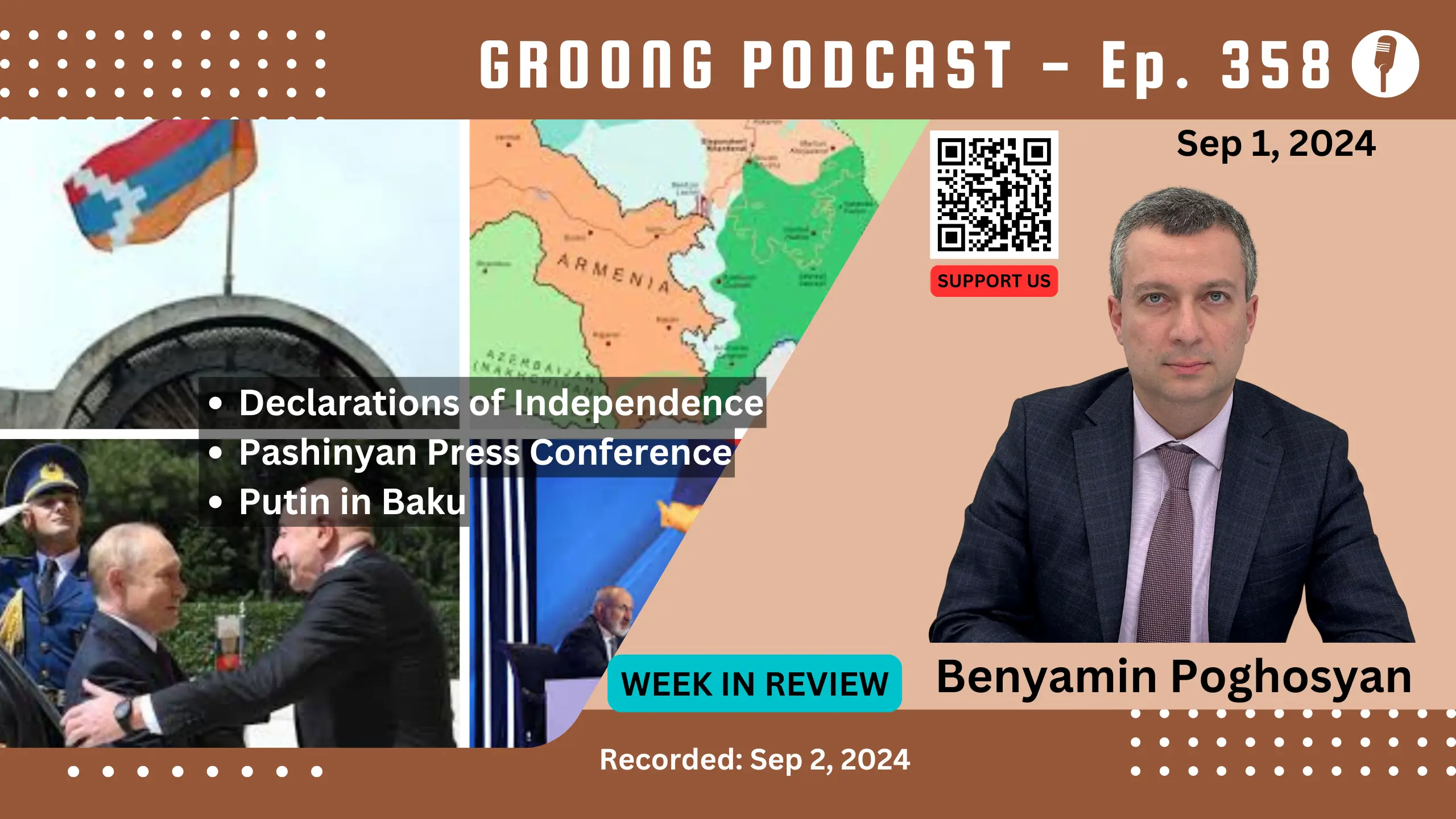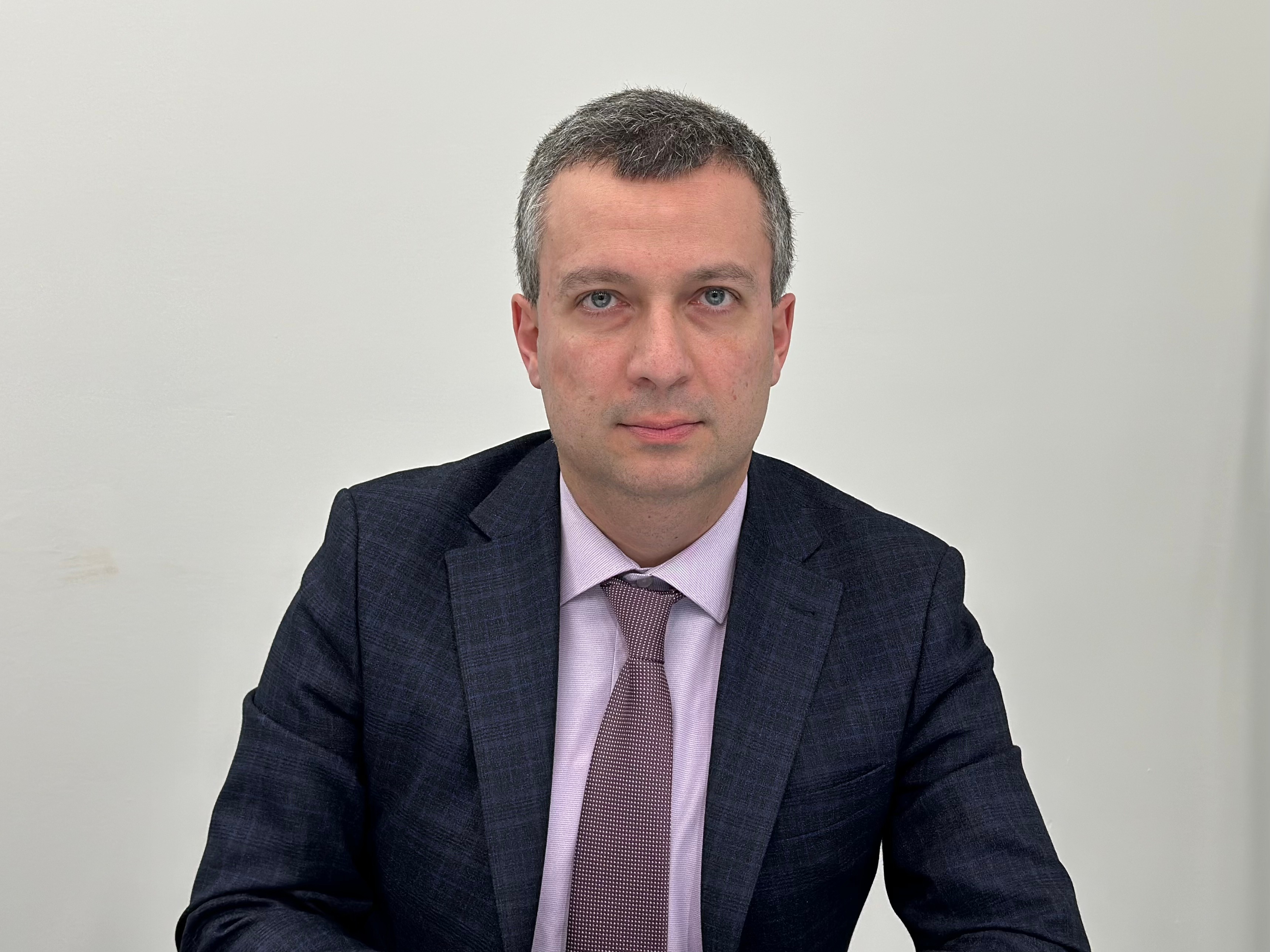
Groong Links:
Guest:
Topics:
- Armenia Azerbaijan Talks
- Declarations of Independence
- Declaration of State Sovereignty of Armenia (1990)
- Artsakh Independence Day - September 2 (1991)
- Pashinyan Press Conference
- Negotiations Formats
- Artsakh Rights & Security as Pashinyan’s “National Security” Problem
- Armenian and Azerbaijani Constitutions
- Liberating Occupied Armenian Territories
- Putin in Baku
- Azerbaijan’s Application to BRICS
Episode 358 | Recorded: September 2, 2024
Show Notes
Declarations of Independence
The past 10 days were memorable with 2 notable anniversaries:
- On August 23, 1990 the declaration of state sovereignty was adopted in the Supreme Soviet of the Armenian SSR.
- On September 2, 1991 the Republic of Artsakh declared its independence from the Soviet Union.
It is interesting to note that the August 23 declaration in Armenia referred to the desire to unify the Armenian SSR, Nagorno Karabakh (NKAO), and the region of Shahumyan. Meanwhile, a year later, the authorities of Artsakh at the time decided to go for full independence, with their declaration.
And here we are, 33 years later from that date with an ethnically cleansed Artsakh and Azerbaijan demanding that Armenia’s own constitution be changed to remove any vestiges or reminders that there ever was something called Karabakh. And of course, we have a regime in Armenia that appears to be yielding to one demand after another. At best, Pashinyan is trying to wiggle away using word play.
This week was no different as in a publicized statement on the occasion, Pashinyan tried to make the argument that the entire declaration of independence need not be addressed literally.
Question:
- What are your thoughts about the significance of this day, Pashinyan’s statement, and attempts to change the constitution?
Pashinyan Press Conference
Two days ago on Saturday, August 31, Pashinyan held a press conference. Let’s review some of the points from that event.
Negotiation Formats
He said that on Friday (the 30th of August) Armenia proposed to Azerbaijan to sign the latest draft of the “peace treaty” as is, with 13 out of 17 points in the agreement fully agreed upon. The rest would be worked on, going forward. He offered to meet Aliyev on the border between the two countries to discuss bilaterally.
Of course, Azerbaijan immediately rejected this idea, saying that the Pashinyan team had simply deleted the contentious references, including the demand to change Armenia’s constitution. It’s important to note that in these “bilateral negotiations” the sides appear to be simply emailing each other a Microsoft Word document, with “Track Changes” turned on.
Questions:
- Do you think there’s enough trust or goodwill between Armenia and Azerbaijan, or just between Pashinyan and Aliyev, that bilateral negotiations can yield any positive results for Armenia?
- Do we know what the 17 points are, and which 13 points have been fully agreed upon?
- Is Azerbaijan’s posture simply meant to throw a monkey wrench in the negotiations, and remove any possibility for a peace treaty, however vacuous that treaty will be?
Armenia and Azerbaijan Constitutions
Pashinyan stated that the Armenian constitution does not contain claims on Azeri territory, but Azerbaijan’s constitution does contain significant claims to Armenian, as well as Georgian territories. He pointed out that Azerbaijan lays claim to 45-46,000 square kilometers of additional territories in the South Caucasus, but that he’s not bringing up this issue in the negotiations because it would block the talks.
Supposedly he’s relying on a clause in the agreement that stipulates that domestic law may not be used to block any part of the agreement.
Question:
- Does this stipulation in the agreement about domestic laws give you the warm and fuzzies about living securely in Armenia?
Artsakh Pashinyan’s National Security Problem?
Pashinyan blasted Artsakh officials in Armenia who have demanded that Armenia stand up for their right to return home. He said that their demands go counter to Armenia’s national security, and that the 1996 Lisbon Principles turned the Artsakh problem into an Armenia problem.
He conveniently avoided discussing his washing of his hands of 150,000 Armenians, their homeland, and their rights and security, when he one-sidedly signed the Prague agreement in 2022.
The Lisbon Principles stipulated territorial integrity of Armenia & Azerbaijan, legal status for Artsakh, and rights and security for them. Then came the Madrid Principles which stipulated territorial integrity of Armenia & Azerbaijan, self-determination for Artsakh, and right of return of all IDPs, rights & security, and demilitarization.
Questions:
- With what logic is Pashinyan blaming Artsakh for its own ethnic cleansing, and claiming that their rights and security, which Aliyev had agreed to, run counter to Armenia’s national security?
- Pashinyan has reportedly also agreed in principle to jointly apply to dissolve the OSCE MG. Does Pashinyan have the right to do this?
Liberating Armenian Sovereign Territories
Pashinyan also said that Armenia does not seek to restore its sovereignty over the 200 square kilometers of territory currently occupied by Azerbaijan, through military force. He said he believes that this can be done through peaceful negotiations.
Questions:
- Do you expect that Azerbaijan will peacefully move out of Armenian territory when a so-called “peace treaty” is signed?
- Is this territorial restitution part of the 17 points in the document?
- Note: Aliyev has said he’s not moving his troops back one inch.
Putin in Azerbaijan
Two weeks ago Russian president Putin was in Baku on a rare, but lavish two-day state visit. He took with him a large contingent of government officials. He joined Aliyev in his residence for dinner, lots of hugs and photo ops, several agreements were signed to enhance economic, strategic, and political relations, and in particular emphasizing and extending their strategic partnership under the Declaration of Allied Interaction until 2026.
Questions:
- What were the main outcomes of Putin’s visit to Baku, and how does the reinforced strategic partnership between Russia and Azerbaijan affect Armenia?
- Does the strategic relationship between Russia and Azerbaijan compete with those between Turkey and Azerbaijan? For instance, was Azerbaijan’s recent agreement to defer the “Zangezur Corridor” precondition to a later date a concession to Putin?
- We know that it was the US that had been touting the “Middle Corridor” recently in which it sees Turkey play a central role. So is the delay in coming to an agreement on it essentially a loss for the US?
- If so, what did Putin get in return?
Azerbaijan stated that it is willing to sign an agreement with Armenia with Russia as the mediator. Armenia has all but excluded Russia. The West doesn’t have enough levers to impose an agreement on Azerbaijan, and we’re not sure if bilateral talks are yielding any real results. Rather, it seems like all the substantial differences are being excluded in favor of signing an agreement on principles alone.
Questions:
- Where does this leave the talks between Armenia and Azerbaijan?
Azerbaijan’s Application to BRICS
The day after Putin’s visit Azerbaijan applied for membership in BRICS. Clearly this was a topic discussed between the countries and Putin approved of the idea. So this would seem to put Azerbaijan in the first step of its membership application.
Armenia, meanwhile, launched an Armenia-BRICS Business Cooperation Center. This is not formally a stage of membership application.
Questions:
- Where does Azerbaijan’s application position the country, within the various world economic alignments, whether the East, the West, the Global South, or otherwise?
- What is the Armenia-BRICS initiative about?
- How does alignment with BRICS alter the South Caucasus, and also, where is Georgia in relation with BRICS?
Topics from the Panelists
- Benyamin: Armenia without Artsakh is very vulnerable; All Armenians should think about how to reduce this vulnerability
- Hovik: Sep. 2 as a symbol of what Armenia and Diaspora united as a Nation can achieve, to keep on our agenda
Wrap-up
That’s our Week in Review, we hope you found it helpful. We invite your feedback and your suggestions, you can find us on most social media and podcast platforms.
Thanks to Laura Osborn for the music on our podcasts.
Guests

Benyamin Poghosyan
Dr. Benyamin Poghosyan is a Senior Research Fellow at APRI Armenia, a Yerevan based think tank,and the Chairman of the Center for Political and Economic Strategic Studies. He has served as the vice president for research and head of the Institute for National Strategic Studies at the National Defense Research University in Armenia. Dr. Poghosyan was a Distinguished Research Fellow at the US National Defense University College of International Security Affairs. He is a graduate from the US State Department Study of the US Institutes for Scholars 2012 Program on US National Security Policy Making. He holds a PhD in history and is a graduate from the 2006 Tavitian Program on International Relations at Fletcher School of Law and Diplomacy.
Hosts

Asbed Bedrossian
Asbed Bedrossian is an IT professional, and for years oversaw the central IT enterprise infrastructure and services at USC. His decades of experience spanned across IT strategy, enterprise architecture, infrastructure, cybersecurity, enterprise applications, data center operations, high performance computing, ITSM, ITPM, and more.
Asbed founded the Armenian News Network Groong circa 1989/1990, and co-founded the ANN/Groong podcast in 2020.

Hovik Manucharyan
Hovik Manucharyan is an information security engineer who moved from Seattle to Armenia in 2022. He co-founded the ANN/Groong podcast in 2020 and has been a contributor to Groong News since the late 1990s.
Disclaimer: The views expressed by Hovik Manucharyan on the ANN/Groong podcast are his own and do not necessarily reflect the opinions of his employer or any other organization.